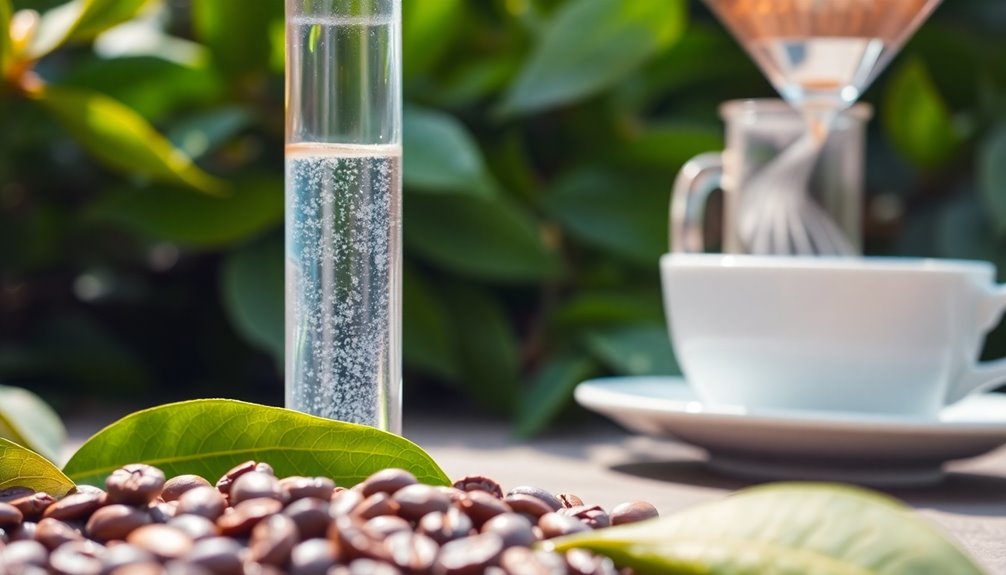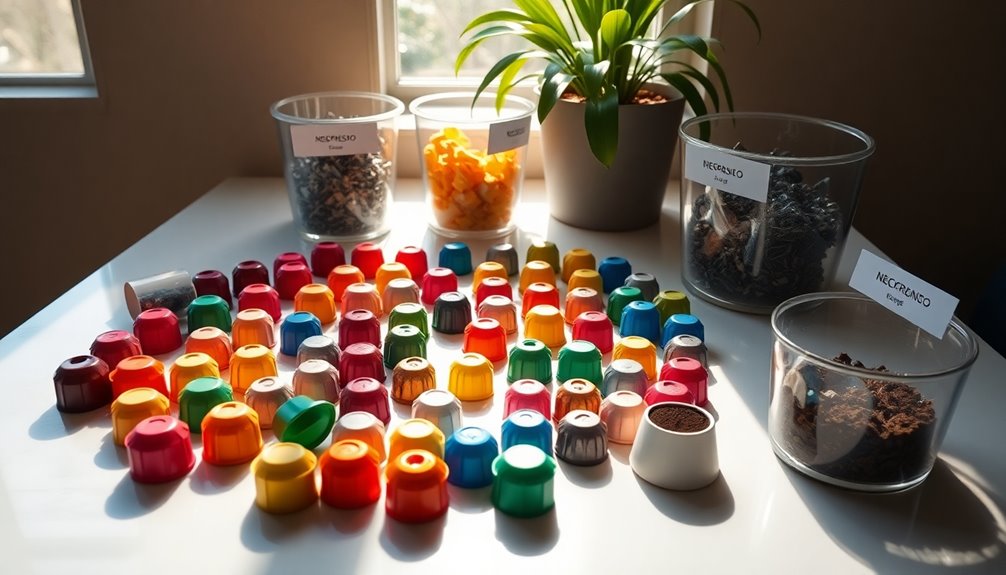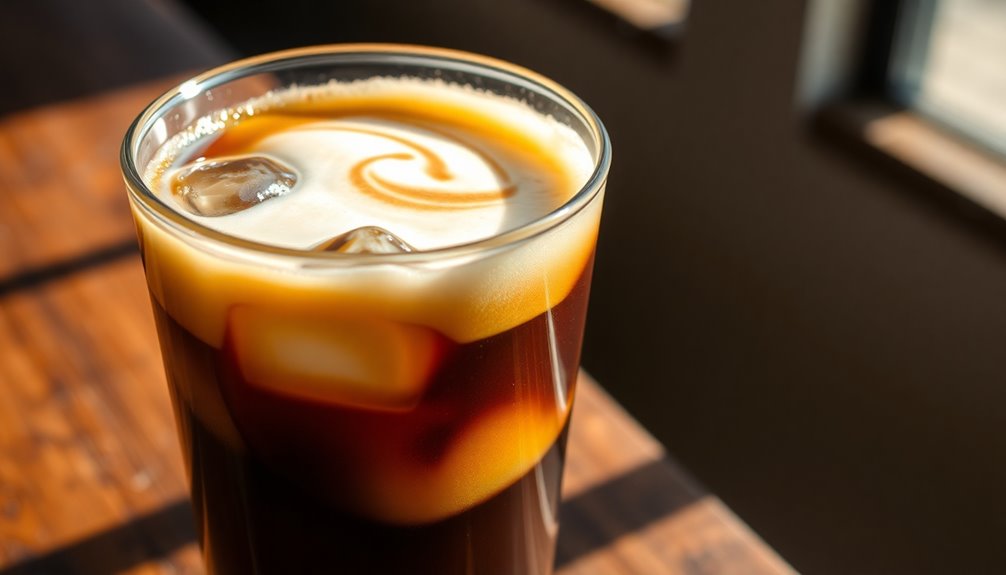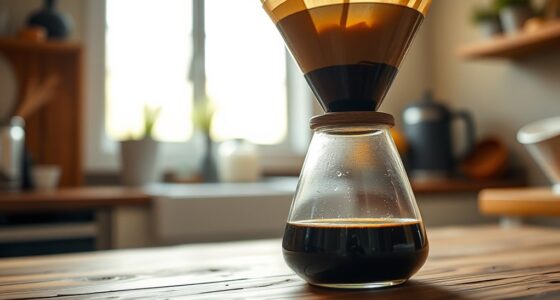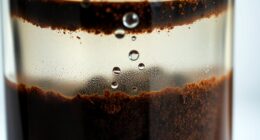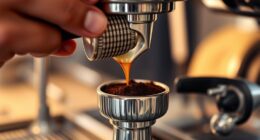Water quality plays an essential role in your coffee's flavor and aroma. It impacts everything from mineral content to pH levels. Ideally, you want balanced calcium and magnesium for clarity and body, while keeping bicarbonates low to prevent a heavy mouthfeel. Contaminated water can lead to harsh tastes, so filtration is key. Pay attention to your local water profile as it can greatly alter your brew. A better understanding of these elements will enhance your final cup. Explore more about how different factors can influence your perfect brew and elevate your coffee experience.
Key Takeaways
- Water's mineral composition, particularly calcium and magnesium, enhances coffee flavor and body, while bicarbonates stabilize pH levels during brewing.
- Ideal pH for brewing coffee is neutral (7.0), with high pH levels potentially muting flavors and affecting fermentation.
- Soft water can lead to flat-tasting coffee, while balanced mineral content is crucial for sweetness and complexity in the final cup.
- Regular monitoring of total dissolved solids (TDS) is essential for achieving optimal flavor extraction, targeting 75-250 ppm for smooth brews.
- Clean, contaminant-free water fosters beneficial microbes, enhancing coffee's flavor profile, while impurities can lead to harsh tastes.
Understanding Water Mineral Content
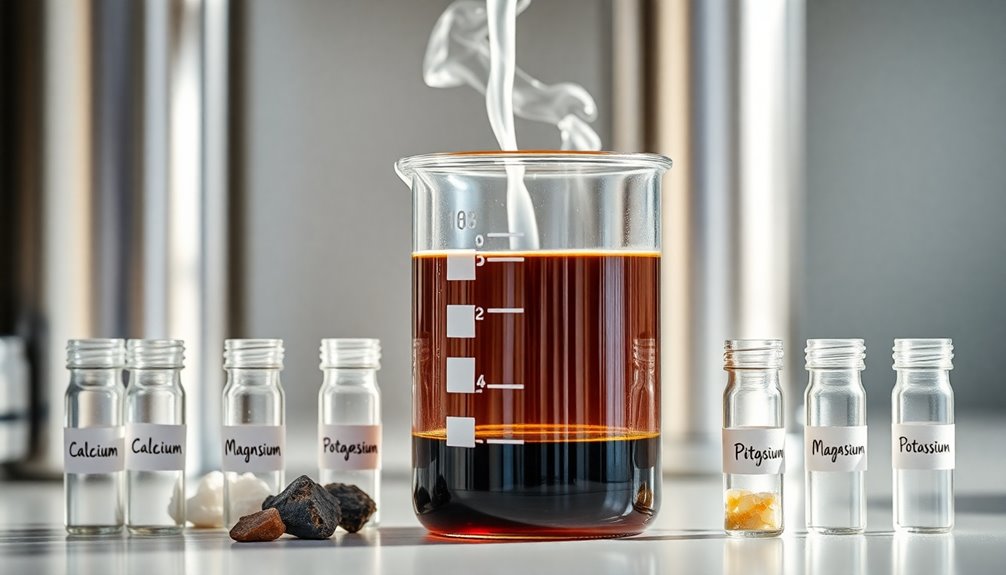
When you're brewing coffee, understanding the mineral content of your water is vital for achieving the finest flavor. Aim for a pH of 7.0, with no odor or color, and zero chlorine.
Your water should have an alkalinity of around 40ppm and calcium hardness between 50-175ppm CaCO3. Important minerals like calcium and magnesium influence flavor and body, while bicarbonates affect pH stability and extraction. Water's mineral content significantly influences the extraction of the 1,500 flavor compounds present in coffee.
Too much bicarbonate can mute acidity, so balance is essential. Potassium enhances sweetness, but high sodium levels can introduce off-flavors.
Effects on Fermentation Process

Understanding how water quality affects the fermentation process is essential for producing high-quality coffee. Water with high pH levels can slow down fermentation, neutralizing acids that are important for mucilage breakdown. Ideally, you want a pH between 3.5 and 4 to keep undesirable bacteria at bay. Additionally, hard water rich in calcium and magnesium can control mucilage breakdown but may extend fermentation time. Potassium encourages microbial growth, enhancing fermentation, while sodium can disrupt it and introduce off-flavors. Total dissolved solids in water can also significantly influence the fermentation outcomes, as they include essential minerals that affect microbial activity.
Contaminated water can lead to harsh tastes, while clean water promotes beneficial microbes. To achieve ideal results, consider adjusting fermentation times and water treatments based on your water's mineral composition and quality. Proper management is key to enhancing the flavor profile of your coffee.
Impact on Final Cup Profile
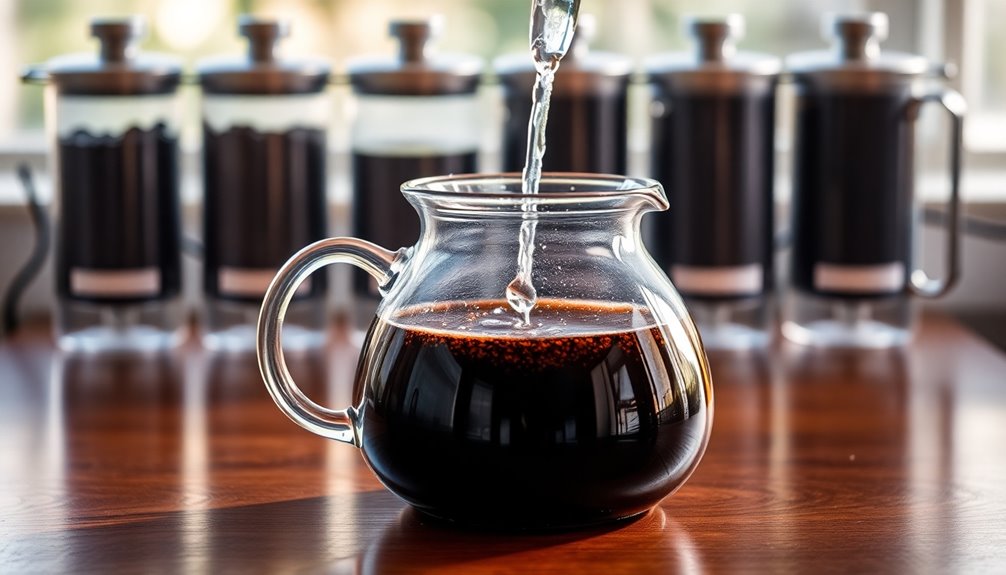
The quality and composition of water you use can considerably impact the final cup profile of your coffee.
If you opt for water with low bicarbonates and higher calcium and magnesium levels, you'll enhance the acidity and clarity, creating a brighter, cleaner finish. Conversely, high bicarbonate levels can mute acidity, resulting in a heavier mouthfeel.
A balanced mineral content, particularly potassium, is essential for sweetness and complexity, promoting beneficial fermentation. However, soft water can leave your coffee tasting flat and lacking in body. Water quality is crucial because it directly influences aroma and taste, which are essential aspects of the brewing process.
Ultimately, the right water chemistry will lead to a rich, full-bodied cup with vibrant flavors and distinct layers, transforming your coffee experience.
Adjusting these factors guarantees you consistently enjoy high-quality brews.
Ideal Water Composition for Brewing

To brew the perfect cup of coffee, it's crucial to focus on the ideal water composition. Aim for a hardness range of 50-80 ppm, as anything below 30 ppm can lead to weak flavor extraction, while over 250 ppm may cause bitterness and equipment damage.
Use water with a pH between 7 and 8.5 to maintain balance in flavor extraction; extremes can negatively impact taste. Your mineral composition should include calcium and magnesium levels of 17-85 mg/L, with sodium around 10 mg/L. Additionally, optimal water hardness significantly influences flavor extraction, making it essential to monitor and adjust accordingly.
Verify total dissolved solids (TDS) sit near 150 mg/L for a smooth brew, while total alkalinity should hover around 40 mg/L to enhance coffee quality. These factors will elevate your brewing experience appreciably.
Brewing Variables and Water Quality
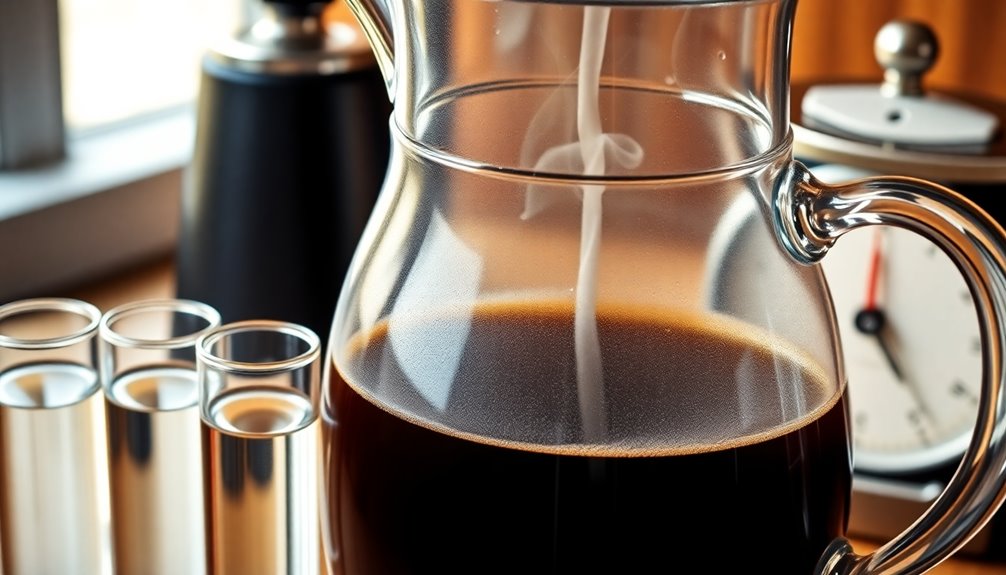
While brewing a great cup of coffee often revolves around the beans, water quality plays a critical role that shouldn't be overlooked.
The flavor and aroma you experience depend greatly on the water you use. Impurities and chemicals can mask the nuanced flavors of your specialty beans. Balanced mineral content enhances clarity and sweetness, while the pH level affects solubility—aim for 6.5 to 7.5. Water composition is crucial because it influences the extraction efficiency and ultimately the taste of your brew.
Total Dissolved Solids (TDS) should sit between 100-250 ppm for ideal extraction. Additionally, consistent water quality guarantees a predictable flavor profile, making it easier to refine your brewing techniques.
Experimenting with different sources can help you discover the best water for your coffee, leading to a more enjoyable experience each time.
Managing Water Quality Techniques

Achieving the perfect cup of coffee hinges on effective water quality management techniques. Start with distilled or reverse osmosis (RO) water to create a mineral-free base. This clean slate allows you to add specific minerals, avoiding the flat taste that pure water can produce. The quality of water significantly affects the taste of coffee, so it's crucial to manage mineral content, pH level, and hardness effectively.
Utilize quality filters to eliminate impurities and improve tap water if needed. Aim for a Total Dissolved Solids (TDS) concentration of 75-250 ppm by using mineral packets that meet Specialty Coffee Association guidelines. You can also blend RO water with mineral-rich water for balance.
Continuously monitor your water with TDS meters and adjust based on taste testing to refine your profile. Experiment and personalize your water treatment for ideal flavor.
Regional Water Variations
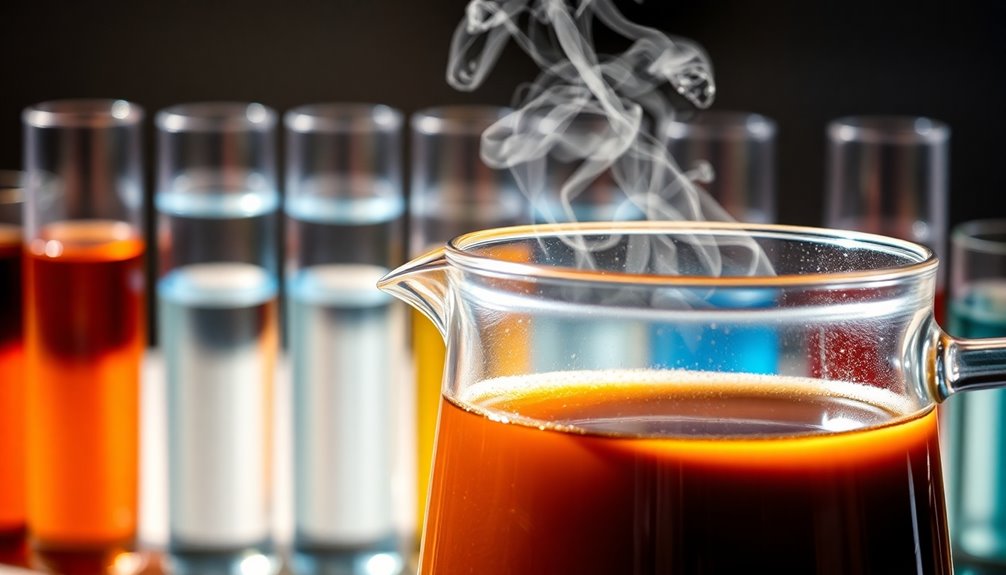
Water quality management techniques lay the groundwork for crafting an exceptional cup of coffee, but regional water variations can dramatically influence the final taste. To achieve the perfect brew, coffee enthusiasts must consider the specific mineral content and pH levels of their water, as these factors can enhance or detract from the coffee’s flavor profile. Additionally, understanding how to install coffee roasting software can be beneficial for roasters looking to profile their beans based on the water they’re using, allowing them to make adjustments that maximize taste. By mastering both water quality and roasting techniques, individuals can elevate their coffee experience to new heights.
For instance, if you're using water from Iceland, you'll enjoy a smooth extraction that highlights the coffee's natural flavors due to its soft profile. This is because soft water allows for balanced extraction, preventing over-extraction that can lead to undesirable flavors. Additionally, using protein-rich options like eggs in your breakfast can complement your coffee experience by enhancing overall satisfaction. Moreover, the use of heat pumps in water heating systems can help maintain optimal temperatures for brewing, ensuring a consistent flavor profile. It's also important to note that HEPA filtration can improve indoor air quality, which may further enhance your coffee experience by reducing allergens that could affect your senses. Understanding the role of brewing methods can also help you adapt your techniques to suit the water you use. Furthermore, utilizing energy-efficient models for heating water can lead to significant cost savings while ensuring the ideal temperature for brewing.
In contrast, New York's mineral-rich water enhances taste while minimizing chlorine effects.
Melbourne's rainwater creates sweet, rounded flavors.
However, London's hard tap water may lead to bitterness if not filtered.
You'll find that hard water generally extracts more flavors, while soft water might leave your coffee tasting flat.
Ultimately, understanding your region's water profile is essential for optimizing your brewing experience and achieving the best flavor.
Experimenting With Water Sources
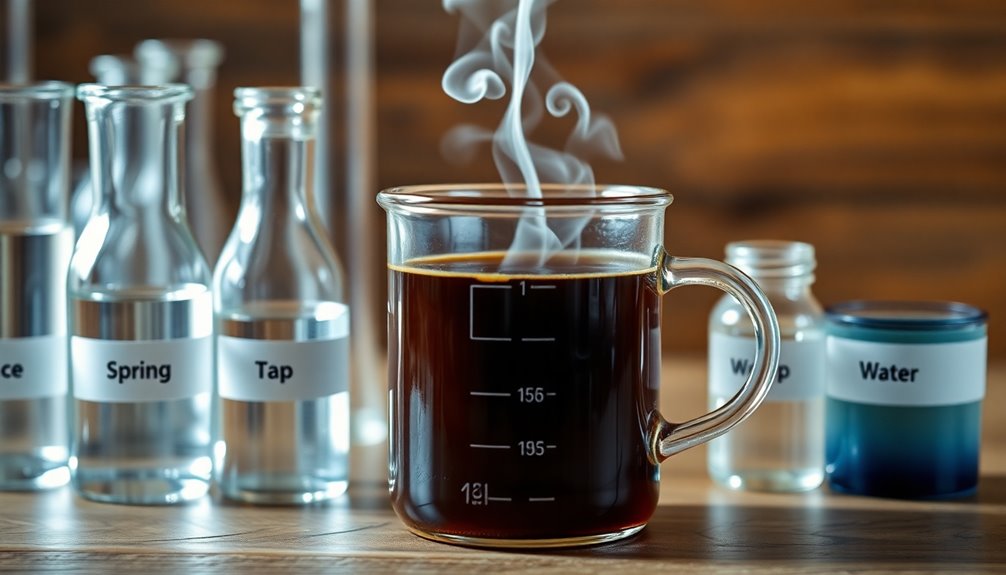
When exploring different water sources for brewing coffee, you'll quickly realize that each type can greatly impact the flavor profile of your cup.
Start by testing bottled water with known mineral compositions, as natural spring water often balances those essential minerals. You might also consider using filtered water to eliminate impurities and control mineral content for better extraction. High-quality water is crucial, as it directly influences the final taste of your coffee. Additionally, the use of anti-inflammatory compounds like curcumin can enhance overall health, making your coffee experience even more enjoyable. Air purifiers can help ensure the environment where you brew is clean, further enhancing the flavor of your coffee. Maintaining indoor air quality is vital for a pleasant brewing atmosphere. Consuming beverages made with nutrient-rich ingredients may also complement the benefits of well-brewed coffee. Incorporating fiber-rich ingredients like chia seeds into your diet can support overall digestive health, which may enhance your coffee enjoyment.
Don't overlook reverse osmosis (RO) water; combining it with mineral concentrates can achieve a superior profile.
Keep a record of your brewing experiences, comparing flavors from various sources like tap and filtered water. This iterative process helps you refine your technique and discover which water truly enhances your coffee.
Experimenting with these sources makes all the difference in your daily brew!
Importance of Water Filtration

While you mightn't think about it often, the quality of water you use for brewing coffee plays an essential role in the final flavor.
Water filtration is vital because it removes impurities like chlorine and sediment, enhancing the taste and aroma of your brew. Charcoal filters are a popular choice, preserving beneficial minerals and maintaining a balanced flavor profile. Additionally, having the right mineral balance in your water can enhance fruity and citric flavors in the coffee.
Conversely, systems like reverse osmosis can strip essential minerals, resulting in bland coffee unless you re-mineralize the water. Also, water softeners can help reduce hardness, protecting your equipment and improving extraction.
Monitoring Water Characteristics
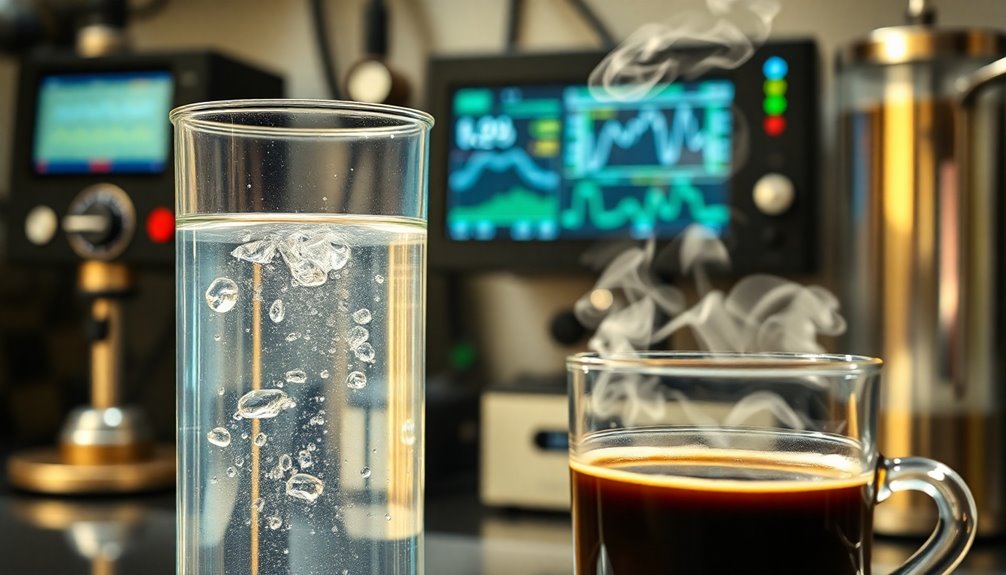
To brew the perfect cup of coffee, keeping an eye on water characteristics is essential.
Start by monitoring water hardness, aiming for a range of 50-80 ppm. This balance enhances flavor without risking equipment damage.
Next, check the pH level; ideally, it should sit between 6.5 and 7.5 for optimal extraction. Remember, high pH can mute flavors, while a neutral pH of 7 helps your coffee shine. Caffeine content varies between different coffee species, which can influence the overall flavor profile of your brew.
Pay attention to mineral composition, focusing on calcium and magnesium for flavor extraction.
Finally, consider your water source. Municipal tap water, spring water, or bottled options vary in mineral content and can greatly impact taste.
Regular testing or quality reports can guide your brewing decisions effectively.
Frequently Asked Questions
How Does Temperature Affect the Interaction Between Water and Coffee?
Temperature greatly affects how water interacts with coffee. When you brew at the ideal range of 195°F to 205°F, you promote balanced extraction, allowing sweetness and acidity to shine.
If the water's too hot, it can over-extract, leading to bitterness. On the other hand, cooler water might under-extract, resulting in a weak flavor.
What Types of Water Are Best for Different Brewing Methods?
For different brewing methods, you'll want to choose your water wisely.
For espresso, use distilled or reverse osmosis water with added minerals to balance acidity.
For filter coffee, aim for water with a balanced mineral profile and a TDS between 75-250 ppm.
Drip methods benefit from similar TDS levels but avoid tap water with contaminants.
Finally, for specialized methods like French Press, guarantee a balanced mineral content to prevent over-extraction.
Can Bottled Water Improve Coffee Flavor?
Yes, bottled water can improve your coffee flavor.
When you choose bottled water with balanced mineral content, it enhances the extraction process, bringing out the coffee's unique notes without overpowering them.
If you're in an area with hard tap water, bottled water can help avoid bitterness and metallic tastes.
Just make sure you check the mineral levels; too many can lead to over-extraction and a bitter brew.
The right water makes all the difference!
How Often Should I Test My Water Quality?
You should test your water quality at least three times a year, especially if your source changes seasonally.
If your results stay consistent over multiple tests, you might cut back on testing frequency.
Always check local water reports for a baseline and consider using home testing kits or TDS meters for convenience.
Regular testing not only guarantees better brewing conditions but also helps maintain your equipment, extending its life and enhancing performance.
What Are the Signs of Mineral Buildup in Coffee Equipment?
You'll notice signs of mineral buildup in your coffee equipment through various indicators.
Look out for strange flavors or odors in your coffee, reduced water flow, and longer brewing times.
You might see brown stains or crusty residue on parts, and hear unusual sounds like grinding or hissing.
If your machine displays error messages or frequently malfunctions, it's a clear sign that mineral buildup needs your attention.
Regular maintenance can help prevent these issues.
Conclusion
In summary, the quality of water you use plays an essential role in your coffee's flavor profile. By understanding water mineral content and its effects on brewing, you can elevate your coffee experience. Experimenting with different water sources and monitoring their characteristics will help you find the perfect balance. Remember, great coffee starts with great water, so don't overlook this vital element in your brewing process. Enjoy discovering the impact of water on your favorite cup!
